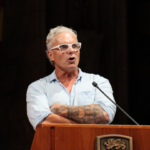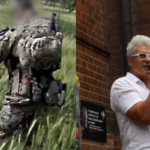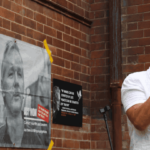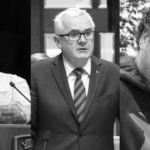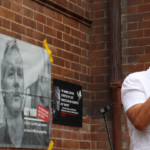McBride Back On: Prosecution Attempts to Tender Post-Plea “National Security” Evidence

As many were aware, ADF whistleblower David McBride was set to go before the ACT Supreme Court next week to be sentenced, after he pleaded guilty to three national security charges, as the entire state apparatus shut down all means of defence available and left him with no option but to.
However, last Friday, a document arrived from the Crown, as both the defence and the prosecution were preparing their final submissions, and it contained never-before-seen “national security” evidence. And as far as McBride and his lawyers were concerned, they weren’t going to have it.
“I did not plead guilty to that and never will,” said McBride on Wednesday, pointing to the issue with the prosecution having dumped new evidence on the table so late. “I want to be before a judge now and away from these petty games.”
But games have been aplenty in the pursuit of the lawyer who, over two tours serving as an Australia Defence Force legal officer in Afghanistan over 2011 and 2013, became so disturbed by how special forces was being run in the field, that he blew the whistle and exposed war crimes to the nation.
And this new trick of catapulting fresh materials in, which are unfavourable to the former British Army Major, is, for all we know, not the last such game, as next week’s hearing is now being adjourned to a future date that’s expected to be announced on Thursday.
Truth teller
“It is new evidence in the form of an expert opinion spanning dozens of pages,” said defence lawyer Mark Davis, who long ago became used to dealing with these government curveballs. “We reject the opinion.”
“We object to it being served after the plea of guilty and if it is allowed to be tendered. We expect to be given adequate time to seek our own expert opinion,” the lawyer said in a 6 March statement. “His Honour abandoned the sentence date today and a new date will be found.”
As McBride told Sydney Criminal Lawyers back in 2019, he took his complaints about a war in which military leadership wasn’t “following the law” and “everything was done for appearance” to his ADF seniors, expecting them to act, but when they didn’t, he took his story to the press.
The result was 2017’s The Afghan Files, which divulged horrifying details of Australian special forces perpetrating war crimes. And McBride was arrested in 2018, with his prosecution greenlighted by then attorney general Christian Porter, who ensured his case would be shrouded in secrecy.
But since the release of the Brereton report in November 2020, which, on having inquired into SAS operations in Afghanistan referred 19 personnel to the AFP for potential war crime charges, McBride still remains the only individual to have faced criminal proceedings over these matters.
And much of the public don’t understand why the government hasn’t simply dropped the charges as running the case has been expensive and become increasingly embarrassing, especially after Brereton vindicated his actions.
Indeed, why condemn a man over revealing the details of the SAS killing and harming civilians and prisoners of war, which is obviously information that is in the public interest, especially if you commission a yearslong inquiry into the same matters?
The public’s right to know
The 2020 Senate inquiry into press freedoms recommended the Commonwealth prosecutor “urgently reconsider, on strong public interest grounds” whether to continue its pursuit of lawyer David McBride.
The committee investigation was sparked by the June 2019 AFP raids, one of which saw a search warrant executed at Sydney’s ABC office in relation to The Afghans Files report and related data storage devices were removed from the premises.
The Alliance Against Political Prosecutions wrote to AG Dreyfus, right after he’d dropped the prosecution against other high-profile whistleblower Bernard Collaery in mid-2022, asking why he didn’t too use his power to free McBride. Yet, he simply provided a convoluted answer as to why.
A long-time supporter of McBride’s, Greens Senator David Shoebridge on Wednesday called out the prosecution for “yet more delay and uncertainty” in regard to his case, as the lawyer has “already had his life put on hold long enough”.
“It has all the hallmarks of the prosecution trying to strap up their case,” the Greens justice spokesperson made clear, “desperately putting on late evidence as part of an ongoing attempt to smear McBride’s character inside and outside court.”
A travesty of justice
McBride faced five national security charges when he went before the ACT Supreme Court in November.
These included one count of theft of property from a Commonwealth entity, contrary to section 131.1 of the Criminal Code Act 1995 (Cth) and three counts of unlawfully giving information to defence, under section 73A(1) of the Defence Act 1903 (Cth).
The final charge was one count of disclosure of confidential information by a Commonwealth officer, under since repealed section 70 of the Crimes Act 1914 (Cth). This crime is now reflected under section 122.4 of the Criminal Code and applies to current and former federal officers.
But as McBride suggested on Wednesday, the new attempt to raise a fresh expert opinion that’s likely to have an adverse effect on his sentencing outcome is simply another “petty game” in a decadelong saga, and his team is now preparing a response to that report.
The path to justice was going to be strewn with debris, it became clear, when McBride attempted to argue the whistleblower defence available to him under the Public Interest Disclosure Act 2013 (Cth), which is legislation Dreyfus drafted during his last stint as the Gillard-Rudd AG a decade ago.
McBride was to put his defence to the court on 27 October 2022, but it didn’t proceed, as on attempt 80 percent of the hearing was to be closed, his only two witnesses were challenged, and a late public interest immunity claim meant the prosecution could remove any defence evidence.
Dreyfus then delivered on his pre-election promised PID Act reforms with a first tranche of priority amendments introduced the month after McBride had exhausted his chances with those laws, which were supposed to protect whistleblowers in the act of revealing information in the public interest.
And a week into McBride’s trial last November, Justice David Mossop permitted the prosecution to sweep in and remove key defence evidence deeming it a threat to national security, and this final insult was the fatal blow to his defence case and McBride pled guilty to three charges.
“The ruling was he doesn’t have a duty to serve the interests of the Australian people, he has a duty to follow orders,” Davis explained out the front of the court after McBride had entered his pleas. “It is a very narrow understanding of our view that takes us back really to pre-World War II.”
The ruling effectively upheld the Nuremberg defence, which comprised of former Nazi officials arguing they’d “just followed orders” in carrying our heinous war crimes, which the post-World War II Nuremberg Tribunal found provides no immunity to a prosecuted individual.
“The change has begun and if it means I have to go to gaol for a very long time, I will be very sorry for my family and my girls,” McBride, a father-of-two remarked on Wednesday, as he awaited his new sentencing date.
“But I can hold my head high knowing I served my country with honour, and I’ve done my duty.”



